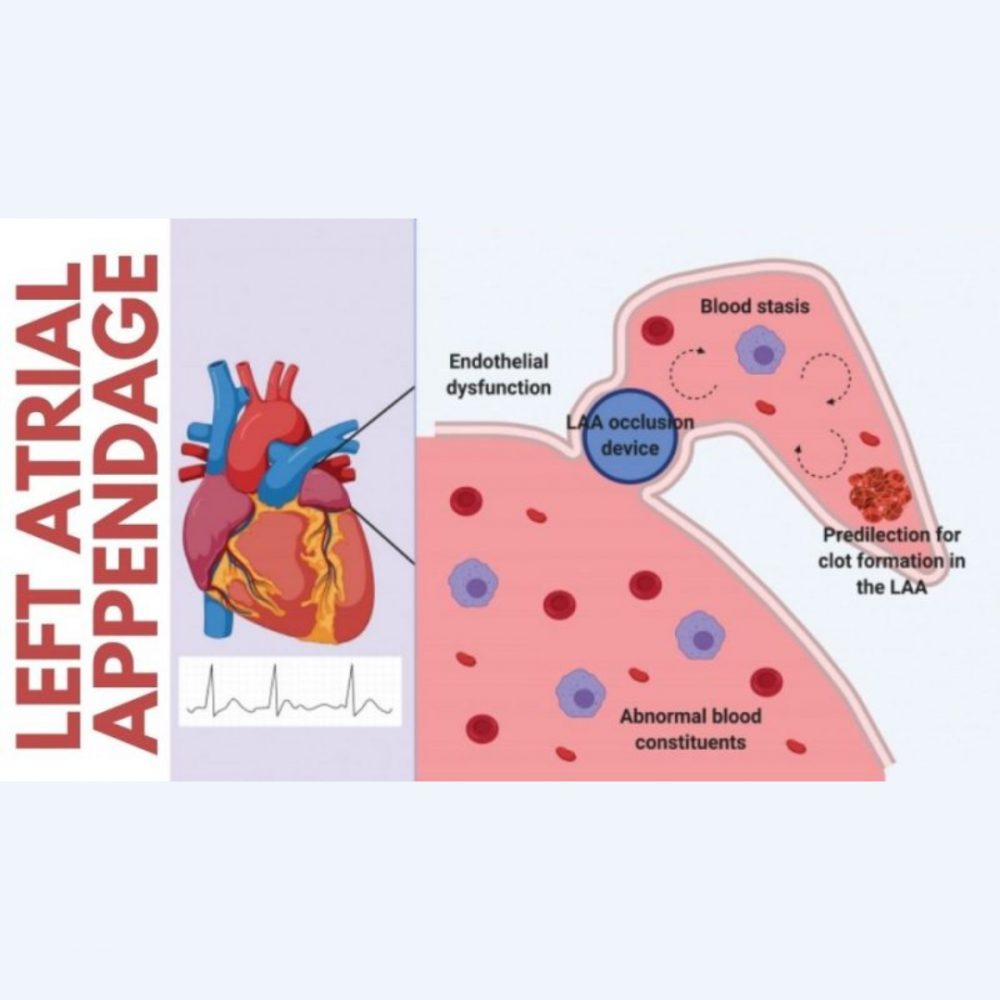
The left atrial appendage (LAA) is a structure in the left upper chamber of the heart. When some patients develop atrial fibrillation(AF) (an irregular heart beat), blood flow within the left heart chamber and especially that in the LAA becomes sluggish. This can lead to an increased risk of clot formation within the LAA. Occasionally, these clots can migrate and travel via the bloodstream and lodge themselves into blood vessels causing disastrous consequences. If the blood vessel obstructed is in the brain, stroke occurs, If the clots lodge into blood vessels of the intestine or limbs, organ damage ensues
This is the reason blood thinners are offered to patients once AF occurs.
Unfortunately, some patients are unable to take blood thinners or may have experienced severe bleeding from these medications. An alternative option for these patients is the LAA closure procedure. 90% of clots in patients with AF develop within the LAA. Therefore, closing off the LAA was done by cardiac surgeons when they operate on patients. We can now do this without open surgery.
Pre-planning is done by transesohageal echocardiogram (ultrasound) through the mouth or a computed tomography of the heart (CT scan). These are done to determine the shape and size of the LAA. The patient is then brought to the catheterization laboratory for the procedure. The procedure is done under general anesthesia with ultrasound and X-ray guidance, A small tube is first placed in the right thigh. Through this, a transseptal passage is made using a specialized catheter and needle to traverse the wall which separates the left and right atrium. After this a specialized device (LAA occlude) is placed within the LAA and plugs up the opening of the LAA. After some time, tissue grows over the LAA opening and then closes this permanently. This would then reduce the chance of clot formation within the LAA. Most patients following this procedure can then be protected from stroke without the need of potent blood thinners.
To learn more, please watch the video.
Procedures
Procedures
Procedures
Procedures
Procedures
Procedures
Procedures
Procedures
Procedures
Procedures
Dr Pipin Kojodjojo specializes in cardiac electrophysiology and management of heart rhythm disorders in both adolescents and adults.
Experienced in managing patients with atrial fibrillation and unexplained blackouts (syncope).
Dr Chuang Hsuan-Hung is a heart failure intensivist trained in advanced cardiovascular imaging. He specialises in heart failure and heart transplant intensive care.
Experienced in managing genetic heart disease, cardio-oncology and sports cardiology.
Dr Stanley Chia is an interventional cardiologist with a distinguished academic record.
He is skilled and experienced in managing complex cardiovascular disease and difficult coronary interventional procedures like stenting of the left main artery.
Dr Jeremy Chow is an electrophysiologist specialising in the implantation and management of electronic cardiac devices.
Experienced in arrhythmia management, stroke prevention and trained in procedures such as electrophysiology studies and ablations.
Dr Tan Chong Hiok is an interventional cardiolgist trained and specialises in stenting of the left main artery and chronic total occlusion.
He is experienced in managing complex cases in patients who have declined or are unsuitable for bypass surgery.
Dr Goh Ping Ping is an echocardiologist trained in imaging of the heart.
She is a strong advocate of preventive cardiology and awareness for women’s heart health. She manages a broad spectrum of cardiovascular disease including heart attack patients.
Dr Chan Wan Xian is a heart failure intensivist specialised in managing complex heart failure and patients with mechanical hearts.
Trained in cardiac imaging and she is experienced is treating women at risk of heart disease, especially during pregnancy.
Dr Edgar Tay is an interventional cardiologist specialised in structual heart disease, adult congenital and pulmonary hypertension.
Trained in procedures like TAVI, Mitralclip and pulmonary angioplasty for chronic thromboembolic pulmonary hypertension.
Dr Cliff Wong is an echocardiologist trained in imaging of the heart.
He specializes in cardiac imaging (echocardiography and cardiovascular computed tomography). Experienced in managing cardiomyopathy, heart failure, valvular heart diseases and cardio-oncology.
Book an Appointment